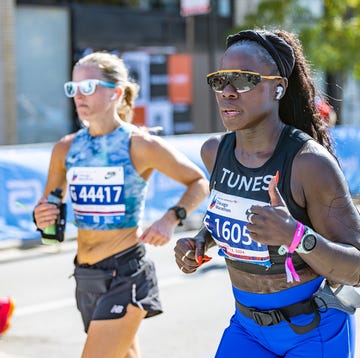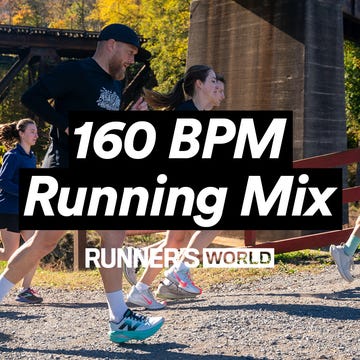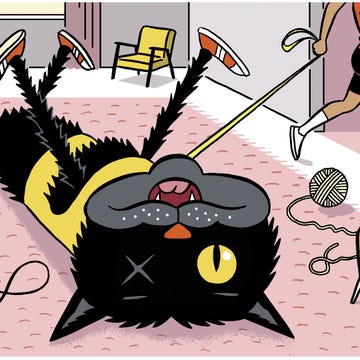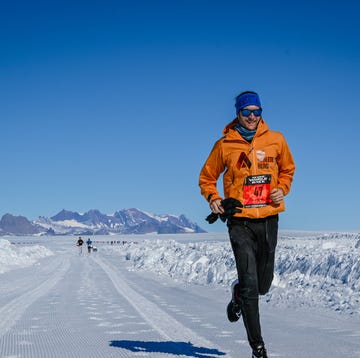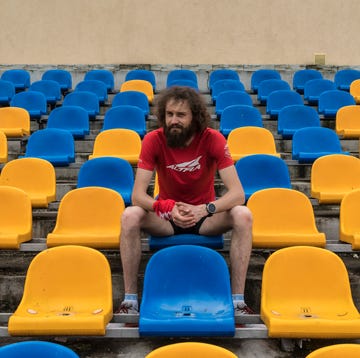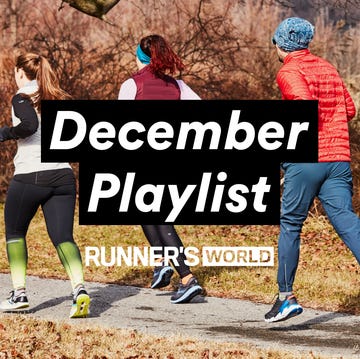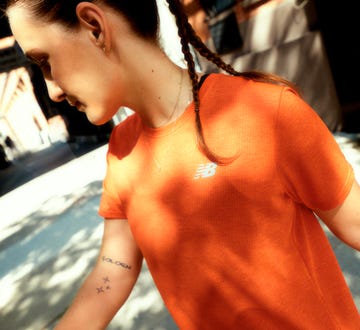I love soccer, but inconstantly. I am utterly oblivious to its charms 99 percent of the time, but then every four years, during the World Cup, I fall in love again for the first time, an Eternal Sunshine of the Footie-less Mind. This last June, as I was watching the games in Brazil, I was marveling anew at the players' grace and athleticism (I'm an oaf), their astonishing skills (I can hardly kick a can), and their running...
Wait a minute. I can run. That's about the only thing I can do, but still... soccer has to be the most running-intensive sport there is; it's estimated that elite midfielders run a full 10-K during a match. So, I asked myself, could a (late) middle-aged man with no skills, no experience, and no real understanding of the game--but with 12 marathon finisher's medals--hold his own on a soccer pitch?
Or to put it another way--could my ability to run a few miles without vomiting actually have some use in a real, you know, sport?
I put out a tweet, which was answered by Emily White, a Chicago singer-songwriter and longtime soccer enthusiast, and a few e-mails later, I was a proud member of Team Orange in the Chicago Metropolitan Sports Association, an LGBT recreational sports league. Jonathan, the league organizer, said, "If you have never played before and have no knowledge of the game, then you will fit right in on that team."
A Part of Hearst Digital Media.
I bought myself some shin guards for $12, but figured old running shoes would suffice instead of cleats, especially since I had no idea how long this experiment would last. (My one prior attempt at soccer, at an intra-dorm match in college, had lasted exactly three minutes, as I stood wondering how I might get the ball away from an opponent, and he ran straight into me, knocking me cold.) On a Saturday morning by Lake Michigan, I put on my new orange team jersey, shook hands with my new teammates (including the catty Jonathan), repeatedly warned them of my ignorance, and took to the field--rather, the "pitch." See? Learning already.
I was assigned to defense, which I assumed was the soccer equivalent of right field, where I had once spent most of my Little League career. I was joined there by a pink-shirted opponent named Sean, whom I was supposed to defend. Sean was about six inches taller than me, at least 10 years younger, and chances were good he had played this game before. But, I figured, if he was posted out here with me, he must suck, too, and how many marathons had he run, huh? I wondered if, during the action, I might actually have a chance to run circles around him.
DAA Industry Opt Out.
It didn't have the lightning pace or surgical passes of World Cup action, so as the first few minutes went by, I found myself standing around and idly watching the muddled activity in the distance--again, much like Little League. But then a Pink player kicked the ball downfield to Sean, who received it with distressing skill and took off down the field toward our goal. I gave chase.
And I couldn't catch him.
This was alarming. I honestly thought that I would be the best runner on either team--did I mention the 12 marathons?--but this wasn't loping a long distance, this was mad sprinting, 50 feet at a time, and as much as I leaned forward and dug those old shoes into the turf, I couldn't close the gap. Another defender intercepted Sean, kicked the ball clear, and the action moved back to midfield.
I gave Sean another look, and realized--finally--that even if poor players were relegated to defense, as I had been, he played for the other team. He was a forward--an attacker. The prestige position, reserved for the most skilled players. And not only was he much more skilled than me, he was just as fast, or faster. This didn't look good.
Orange and Pink were evenly matched, and the action flowed back and forth. Pink had some skilled midfielders, so the ball was often at our end. The action for me was moments of repose interspersed with mad sprinting. I kicked the ball once or twice--in the right direction--and even managed a header. I eventually began to think tactically; depending on where the ball was, I could move toward the Pink goal a fair distance, relying on my one talent to get me back in time if the action reversed.
Sean's skills completely overwhelmed me, as you'd expect; I never managed once to get the ball away from him. But, I eventually realized, I didn't have to. If I could just keep pace with him as he ran downfield, keeping myself between him and the goal, he couldn't take a good shot--he had to either pass it (and a better defender would intercept) or try a weak shot right into our excellent keeper's arms. I like to think that he started to get frustrated--Who is this short bald guy, who can hardly get a foot on the ball, but who just won't get the hell out of the way?
The whistle blew at 50 minutes, with a score of 0-0. I never got to show everybody the Goal Celebration I had planned, which included a backflip and some Western line-dancing. Nor did I ever really get a shot on the goal, although I once headed the ball in its general direction. But Team Pink didn't get to celebrate either. Because, if in only some small way, they couldn't get past me.
My GPS watch, which I kept running between whistles, showed an elapsed three miles run, which seemed a fair distance on a 50-meter field. Most of that running was gentle jogging up and down the pitch, either following or anticipating the action, but there was a fair bit of mad dashing, usually in pursuit of Sean. I was tired, but not winded. I felt, appropriately enough, as if I had just run a fast 5-K. To a great extent, my theory had proven true--at least in a recreational game, and at least on defense (i.e., not having to kick the ball at a target), simply being able to run was a workable substitute for soccer competence.
My teammates congratulated me on a good debut effort. "I like your hustle!" shouted our keeper.
I thanked him, sincerely, and added, "Hustle is all I got."
* * *
Does your running make you better at other sports? Join the conversation on Twitter using #roadscholar and by following @petersagal.
Peter Sagal is a 3:09 marathoner and the host of NPR's Wait, Wait...Don't Tell Me! For more, click here.


